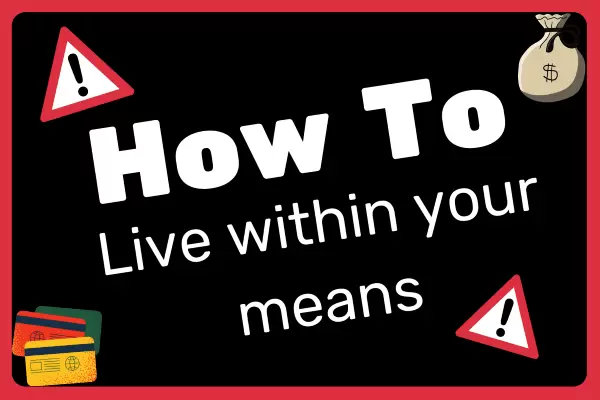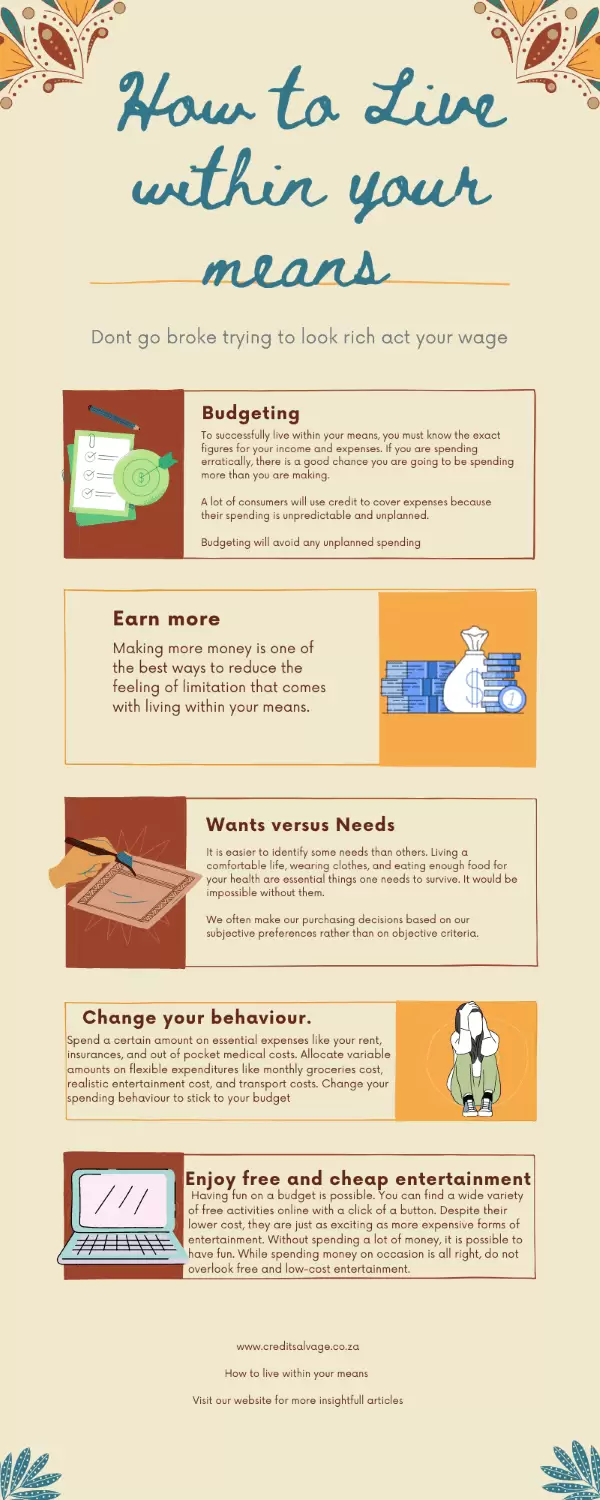How to live within your means
These past 12 months have not been easy for you to live within your means. It has been a tough time for many people who have faced job losses, layoffs, or reduced hours and wages. Many have had to reevaluate their saving and spending habits because of income cuts. To contribute to retirement plans and education, they have had to rethink how much to invest. Financial planning is more crucial now than ever.
Living within their means is a challenging reality for individuals and families due to Covid and economic realities. Putting away credit cards and curbing spending is a first for some.
First, what is it to live within your means? The concept of living within your means is merely not spending more money than what you earn. There is nothing more to it.
Therefore, no matter how much you earn, you should spend less than your net income each month.
Especially if one is earning a lot, it sounds easy, but consumers have so many diverse needs and wants it can be challenging to satisfy them all! What is the point of giving your best in your career if it does not enable you to enjoy the rewards? Besides, it is always nice to show your family and friends what you have accomplished. What is wrong with having wonderful things and living in an expensive and beautiful house you can barely afford? We will explain the importance of why it is necessary to live within your needs
Planning and thinking are essential to living within your means. Take the steps you need to take to fix your finances. For those trying to live within their means in 2021 and 2022, here are some practical tips.
Keep track of your finances with budgeting!
Every time you spend money, you will need to record these purchases. It can be time-consuming; however, it will pay off. A budget must address the following questions to be effective:
- What is my monthly income?
- Where does my money go to cover all my living expenses?
- Where does all my discretionary spending go?
- Am I saving a certain amount of money each month?
To successfully live within your means, you must know the exact figures for the above items. If you are spending erratically, there is a good chance you are going to be spending more than you are making. A lot of consumers will use credit to cover expenses because their spending is unpredictable and unplanned.
A simple spreadsheet or budgeting software can help you keep track of your numbers. Initially, you should create two columns: Income and Expenses. While figuring out your income is easy, figuring out your expenses takes a little more work. Examining your bank or credit card statements could assist you in determining your expenditures. After gathering these expenses, organize them into two columns: living expenses and other expenses.
If everything goes well, you will have a good understanding of your budget by the end of about a month. Rental, water, electricity, insurance, groceries, transportation, entertainment, and so on would be the main categories. Calculate what you intend to budget for each of the categories using your spreadsheet. Do not forget to budget for items like gifts, weekend getaways, holidays, and car repairs, which will only happen now and then but are still necessary.
Creating a budget is an important first step but sticking to the budget is what you should focus on most. Spend some time tracking your spending each week or each month to see if you are adhering to your budget. You can do this on an ongoing basis using a personal finance program or online service but ensure that you monitor where your cash is going.
Depending on your household income, you will see where your money goes each month. Using budgeting as a starting point will help you live within your means.
Budgeting tips
Income and expenses
The very first step is to determine in detail how much money you receive each month in your bank (net income). Equally important is to establish what will be going out of your account (expenses).
You can view most of your spending via your online banking or app. It will also show you regular expenses such as rent or bond repayments, car financing payments, personal loans, credit card costs, water and electricity bills, insurance costs, and monthly subscriptions such as DSTV, Netflix, and Showmax.
Change your behavior.
Spend a certain amount on essential expenses like your rent, insurance, and out of pocket medical costs. Allocate variable amounts on flexible expenditures like monthly groceries cost, realistic entertainment cost, and transport costs. You may want to consider reducing the amount you spend on the above-mentioned flexible expenses. However, it is vital to remain realistic. You must be able to stick to your budget. Managing your money smartly should not interfere with your enjoyment of life; it can help you control your spending.
Be committed.
Write your budget down and stick it up on your fridge or somewhere where you will see it. It will help you stay focused on your goal - financial security.
Track your progress.
Check your budget every month. If things don't go according to plan, never give up. There are also plenty of apps to help you track your budget as you spend daily. And remember, your budget should remain a work-in-progress, which you continually adjust to suit your changing lifestyle.
Here are five reasons why you should live within your means.
- Debt-free living
- Less financial stress
- Financial freedom
- You will start building wealth.
- Easier saving habits
Learn to enjoy free and cheap entertainment to cut spending.
Spending money is fun. All of us enjoy eating out, travelling, and doing all kinds of other enjoyable activities. But the secret to saving money is that you can have fun without spending a lot of money. Having fun on a budget is possible. Cheap or free entertainment includes hiking at the Melville Koppies, reading, taking your kids to play on playgrounds, cooking, listening to free concerts, and seeking out free or discounted museums in your area.
You can find a wide variety of free activities online with a click of a button. Despite their lower cost, they are just as exciting as more expensive forms of entertainment. Without spending a lot of money, it is possible to have fun. While spending money on occasion is all right, do not overlook free and low-cost entertainment.
Here are some fun things you can do for under R200 in Johannesburg - Fun things to do in Johannesburg
This list should be beneficial for young people starting out and for older people actively trying to live within their means.
Earn more so you can live within your means.
Making more money is one of the best ways to reduce the feeling of limitation that comes with living within your means. It is not as simple as adding a workout to your daily routine after a particularly indulgent evening.
Do not be afraid to ask your boss for more money. Investigate more lucrative jobs or create a side business.
Your earning potential does not have to stay constant. Be active in seeking out ways to increase your income that will allow you to live comfortably within your means.
Budget-saving tips to help you live within your means.
- Keeping up with friends and family. Don't be worried about what you don't have since competing with your friends and family can be harmful to your budget.
- Do not buy but try and borrow. Consider borrowing something instead of buying it if you only need it for one day. It would be a pleasure for your friends to help!
- Make a budget. Set a budget for the money you have and how much you need to spend each week and stick to it. To get started with your budget, use our simple worksheet.
- Plan a free family activity. Make your family time enjoyable without spending too much money. There are many free family activities available online.
- Knowing where you are spending your money. The key to living within your means is knowing where your money is going. If you notice that you are running out of money, stop all extra spending immediately and consult your budget.
- Make sure you keep your grocery budget in check. Make sure you do not overspend on groceries. Selecting cheaper no-name brands and looking for specials is a great idea.
- There are many benefits to buying in bulk, including saving money. Despite being more costly upfront, this is a much more cost-effective option in the long run.
- If you downgrade your data and wireless plans on your cell phone and internet plan, you can save quite a bit of money each month.
- Do not waste electricity by leaving the lights on when you are not in the room. Every year, Eskom increases its costs. Your budget will quickly spiral out of control if you fail to monitor your electricity bills.
Establish your wants versus needs if you want to live within your means
It is easier to identify some needs than others. Living a comfortable life, wearing clothes, and eating enough food for your health are essential things one needs to survive. It would be impossible without them. We often make our purchasing decisions based on our subjective preferences rather than on objective criteria.
Through careful examination, find out whether the item you want to purchase is a necessity or not.
Wait a few days before purchasing this item, and you may realize you do not need it all.
Living beyond your means: Five warning signs
Bond or rent payments take up a substantial portion of your income. Everyone would like to live in a luxurious home. If you buy or rent a property you cannot afford, your debt, savings, and living expenses will suffer. Bond or rental payments should not exceed 30 per cent of your income. You can keep your budget balanced by doing this.
The amount of debt you owe is high. You're living beyond your means if you pay a substantial amount towards your debt each month.
You go on holiday using loans and credit cards. You're living beyond your means if you use finance or credit cards to pay for a holiday. It is possible to save money for a holiday during the year, and then you can use that money for a holiday when you need it.
Your finances are always a mess. If you have a massive portion of your income going towards debt repayments, you must make changes right away. Observe all your monthly expenses, particularly your daily expenditures, and cut back as much as possible. If you are heavily overindebted, there are other options to assist with debt. You will receive that immediate relief through debt counselling. Here is a link that describes debt counselling in more detail.
Savings are nonexistent for you. You are living beyond your means if you are unable to save each month.
Conclusion How to live within your means:
Getting back on track with your budget might sound overwhelming if you are used to overspending. In the meantime, the simple steps outlined above will help you get started on your journey toward spending less than you make. Rather than worrying about how to pay your bills, you can begin saving for the future.
Bear in mind that there will be times when doing everything all at once can be a little overwhelming. When unsure what to do, implement a few tips at a time and work your way through them until you have mastered them all.
It is time to act, so do it now! Now is the time to begin creating the worry-free life you deserve!
We offer comprehensive credit bureau clearance, ITC credit bureau clearance and debt review. We have a solution for each need. Click the link below to apply for our services online



